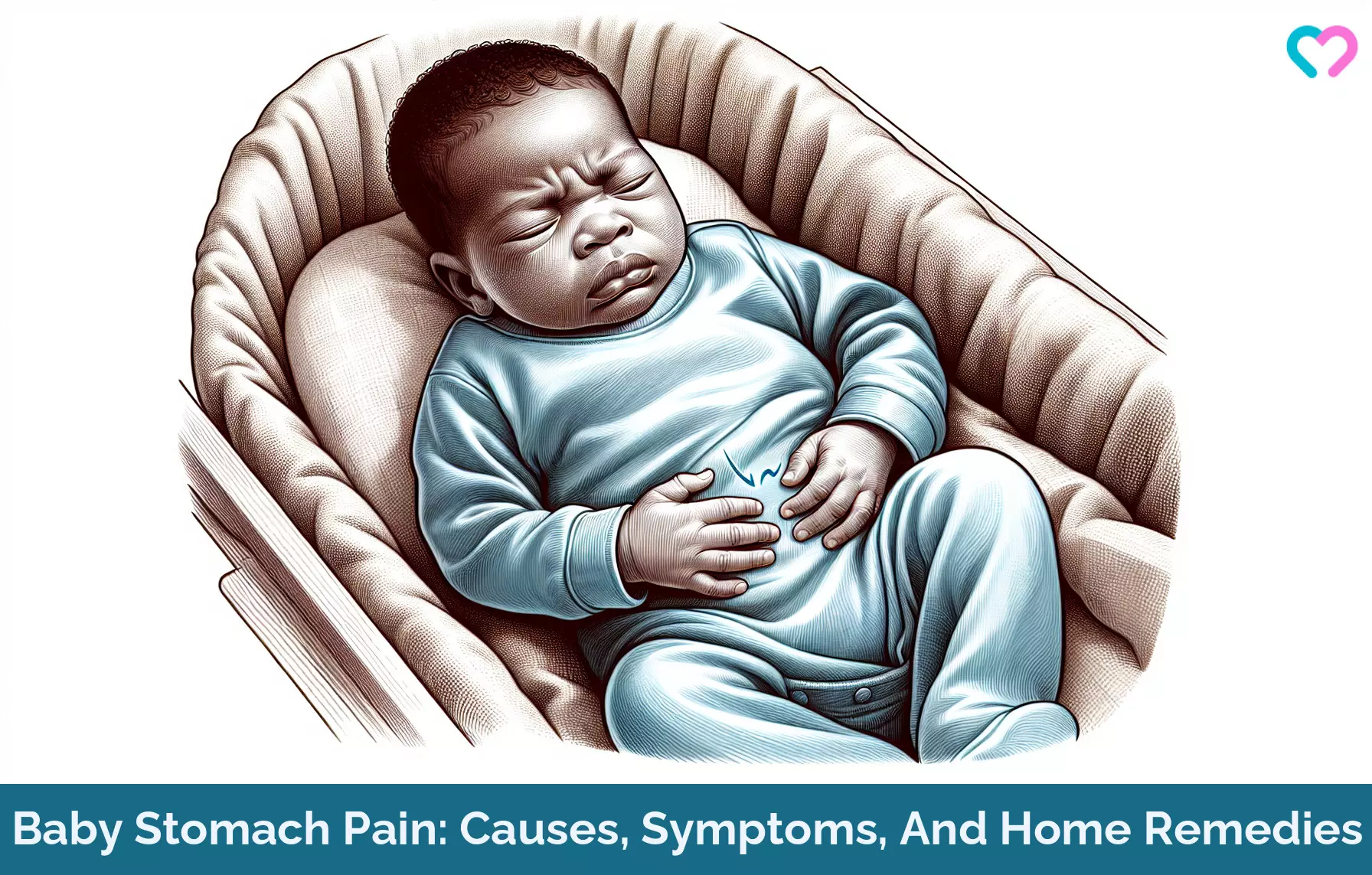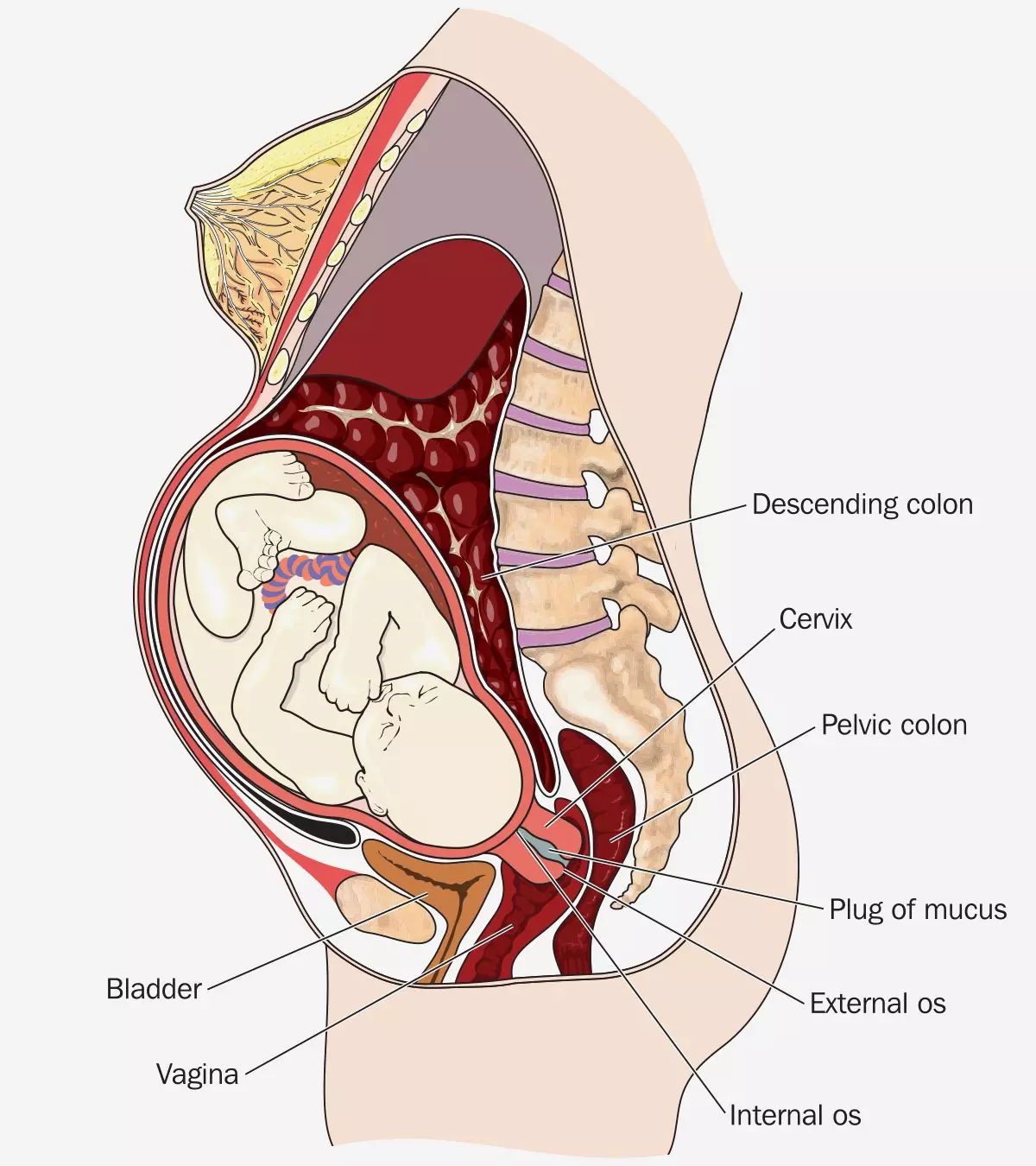
Image: Shutterstock
Stomach pain in infants can be due to various causes, and most cases of stomach pain in babies are self-limiting and treatable with some home remedies. However, in some rare cases, medical intervention may be required.
If your infant has stomach pain a little too often, it would be a good idea to consult a doctor as it could be a problem with their diet or an underlying medical issue.
Read this post as we tell you the causes and symptoms of stomach pain in babies. We also tell you about a few home remedies and preventive measures.
Key Pointers
- Stomach aches in babies may be due to infections, colic, food intolerance, reflux, constipation, gas, or other medical conditions.
- It may be indicated by changes in feeding patterns, rubbing hands on the stomach, and crying (with folding legs).
- Immunization, maintaining hygiene, regulating feeding, avoiding allergenic foods, and burping the baby are a few measures to prevent complications.
- However, advanced medical intervention is required for causes such as appendicitis, hernias, pyloric stenosis, intussusception, and severe infections or toxic poisoning.
- Administering probiotics and including baby-friendly foods along with breast milk are among the remedies to be considered on the doctor’s advice.
What Causes Stomach Pain In Babies?
There are numerous reasons, ranging from infection to injury, for infant stomach ache. Following are some of them:
1. Stomach or intestinal infection
A host of bacteria and viruses could cause bowel problems which could in turn lead to stomach pain, but here the most likely ones:
- Rotavirus: It is the leading cause of intestinal gastroenteritis among infants (1). The infection of this virus causes an acute stomach pain along with diarrhea and vomiting in babies. It can even lead to severe dehydration, and the little one may appear fatigued all the time. Babies older than six months can contract this virus from contaminated food, while in breastfed babies, it can happen due to accidental oral contact of contaminated objects. It can even affect newborn babies.
Rotavirus infection is the leading cause of infant mortality in the world, even though the condition can be avoided through immunization (2).
- Salmonella: It is a strain of bacteria that infects the stomach and intestine, eventually causing tummy ache (3). It primarily spreads through the consumption of contaminated food and water, and if the infant comes into contact with contaminated surfaces. Maintaining good hygiene could help prevent infection.

- Streptococcus: Strep bacteria target the throat, but 10% of streptococcus infections also affect the stomach (4). Staying in close contact with an infected person can easily transmit the disease (5). So, if you have a sore throat, refrain from cuddling with your baby and wear a mask to prevent accidental transmission of the bacteria to your little one.
- Adenovirus: This virus inflames the intestinal walls, causing intense stomach pain. It propagates through contaminated food or if the baby puts a contaminated object in the mouth, which is often the case.
Adenovirus is robust and can survive on objects for extended periods. It can also transmit through the expulsion of respiratory secretions during coughing and sneezing. It is, for this reason, one of the most widely reported causes for stomach infection in child-care centers where babies play with common toys and come in close contact with other infants (6).
Keeping the infant away from contaminated surfaces and objects is the best path to prevention. Parents and caregivers must wash their hands regularly, and the baby’s toys are cleaned periodically.
- Infant botulism Botulism is the infection of the intestine by the bacteria called clostridium botulinum, which the baby acquires by ingesting food contaminated with the spores of the bacteria.
These spores affect the babies as they have underdeveloped natural gut flora. Stomach cramps are among the several symptoms of this condition (7). Treatment involves injecting antitoxins and putting the baby on a ventilator until they are free of botulinum toxiniA toxic substance produced by the bacterium Clostridium Botulinum that affects the muscles and nerves .
- Parasitic infection: This is most likely to occur in babies who are on solid foods. Parasitic infection is essentially the infestation of single or multicellular parasitic organisms in the gastrointestinal tract. Giardia lamblia is one such parasitic organism that can affect babies through untreated water and contaminated food (8).
Many of the above problems affect adults too and can be easily transmitted from parents to babies. Since babies have a developing immune system, they can be more susceptible to the adverse effects of the microorganisms. But do not fret, since these infections are easily preventable through proper precaution and scheduled immunization.
2. Colic

As the researchers at the Grand Strand Medical Center reported, colic is believed to affect about 20% of infants worldwide and six percent of all infants in the US. Repeated bouts of colic in babies can cause sudden fluttering of the intestinal muscles, invariably leading to stomach aches. Note that this is normal colicky behavior, where the baby cries for generic reasons such as frustration. The long bouts of crying due to infantile colic may contract the diaphragm and mount pressure on the intestines, subsequently causing stomach pain.
Treatment: The American Academy of Pediatrics recommends general pacifying techniques such as rocking the infant, taking the baby outdoors in a stroller, or swaddling in a warm blanket to calm them (8).
3. Food intolerance or allergy
Food allergy is when the immune system over-reacts to an external protein by mounting an immune system attack. Food intolerance is when the digestive system is unable to digest certain food compounds, causing discomfort or other digestive issues. Both cases result in stomach aches, among other problems (9). This situation is more likely to affect weaning babies, who are trying out new solid foods. Breastfed babies may also show food allergy/intolerance when they are introduced to formula.
Treatment: There is no cure for food allergies in babies. The best solution is to keep the babies away from allergenic foods. Food intolerance is less severe and usually genetically determined. Also, a baby may not display intolerance to a particular food item when mixed with multiple ingredients. An infant can eventually outgrow the intolerance, but until then, it is good to keep them away from the allergic foods.
A mother of one shares her experience of dealing with allergies in her child and recalls how he overcame his allergies over time at around the age of two years old. She says, “Our son has been diagnosed with a peanut and tree nut allergy since the young age of five months old. Since diagnosed, our home has become a safe peanut and tree nut-free oasis for him… Each year, we see our pediatric allergist for an annual appointment to review his progress… This June, much to our surprise, our son’s almond (tree nut) allergy test came up negative. Our son continues to test positive and severe for an allergy to peanuts.”
She further details how she took her son for an almond allergy challenge test, where he was fed almond butter under observation. The test concluded that her son had outgrown almond allergy. However, their allergist stated that unless they are cracking almonds out of the shells themselves or are buying them from a company that deals exclusively with almonds – they should not consider almonds or almonds products safe for their son (i).”
4. Gastroesophageal reflux
Gastroesophageal reflux is a condition where the contents of the stomach move upwards through the lower esophageal sphincter, which is under-developed in babies. This muscle marks the intersection between the esophagus and stomach. When the stomach acid, along with semi-digested food, gets into the esophagus, it causes irritation and gastrointestinal distress. The baby gags and vomits, while also having a stomach ache (10).
Treatment: The condition is treated after considering various factors such as the age of the baby and the severity of the condition. Usually, a medical practitioner will recommend certain feeding practices such as burping your baby and holding him upright for 30 minutes after feeding (11). For older, weaning babies, you can add rice cereal to their purees to thicken them, which prevents the upward movement of food.
5. Appendicitis
Appendicitis is an acute inflammation of the appendix, which is an appendage attached to the large intestine at the lower right corner of the abdominal cavity. The appendix is a close-ended tube, and if it gets obstructed by a fecal particle, it swells. This blockage increases the pressure within the appendix, causing a sharp pain at the lower right corner of the abdomen. A common symptom of appendicitis, it is usually associated with fever and vomiting. The pain is usually so intense that the infant would cry incessantly (12).
Treatment: Prompt medical attention is essential to get this condition treated. Any delay can cause the appendix to burst. Surgical removal of the inflamed appendix is the only treatment for appendicitis.
6. Pediatric hernia
occurs when the small or large intestine slides out of the abdominal cavity, causing discomfort and sometimes infection. Infants are at risk of two types of hernia – inguinal and umbilical (13). An inguinal hernia occurs when the intestine slips into the inguinal canal leading to swelling around the groin. An umbilical hernia occurs when the abdominal wall, right behind the navel, is damaged and lets a small section of the intestine slide out. Hernias can cause tissue atrophy, which is the death of tissue due to a lack of blood supply.
Treatment: Fortunately, hernias are visible from the outside, and therefore, can be noticed by a parent or a doctor during a routine checkup. Hernias close on their own over a period, but if they are painful, then medical intervention may be required. Surgical rectification of the breached intestines is a possible treatment for the condition.
7. Intestinal blockage
Intestinal blockages are two types:
- Pyloric stenosis happens when the muscles of the pylorus, the lower section of the stomach, enlarge abruptly and restrict the flow of food from the stomach to the small intestine (14). Infants with the condition will be hungry all the time but would vomit and have a constant stomach ache. Surgical treatment is how the problem is treated. However, a pediatric consultation is wise to decide on it ultimately.
- Intussusception is a rare condition where one section of the intestine collapses on the other, creating a thick fold, which eventually becomes a blockage. The food doesn’t pass through easily since the intestinal muscles are unable to contract properly, and the blood vessels and nerves in the fold get squeezed. It can cause stomach pain in infants who are fed before bedtime at night. These children usually have blood in loose stools, vomiting, and abdominal swelling. Surgery might help rectify the fold and treat the problem (15).
8. Inflammatory bowel disease
Inflammatory bowel disease is a term referred to a group of diseases that cause painful inflammation of the inner lining of the digestive tract – anywhere from the esophagus to the large intestine. Chronic stomach pain, vomiting, and diarrhea are some of the classic symptoms of this problem.
These diseases can be rare in babies, but ulcerative colitisiA chronic condition leading to inflammation and sores in the large intestine due to an abnormal immune response and Crohn’s diseaseiA chronic inflammatory condition that affects the digestive system, causing abdominal pain, diarrhea, and weight loss are two inflammatory bowel diseases that can rarely affect infants (16). These problems are mostly a result of extreme genetic mutation. There is no definitive treatment for this condition, and medication is aimed at cutting down the intensity of the pain and associated symptoms (17).
9. Urinary tract infection
Urinary tract infections (UTI) can strike as early as 12 months or even earlier (18). The tell-tale signs of the condition are a pain in the lower abdomen region and discomfort while urinating. UTIs are caused by bacterial invasion of the urinary tract. They occur due to poor sanitary hygiene, such as delay in changing soiled diapers and unclean groin area.
Treatment: Antibiotics are the only treatment to UTIs, and in breastfed infants, it can be administered directly to the bloodstream using intravenous therapyi A process of injecting fluids, medicine, or nutrients into a person's vein (19).
10. Constipation
Constipation in babies younger than 12 months is very common and causes hardened stool that is very tough to pass. The retention of fecal matter for abnormally long durations causes bloating of the abdomen, leading to stomach pain and cramps (19).
Treatment: Weaning babies should be fed a diet rich in vegetables and coarse grains such as oats and barley. They should be made to drink enough water. Some simple massages and exercises recommended by a pediatrician can also help relieve baby constipation.
11. Gas

Flatulence in babies is common. Babies ingest air if they do not latch on to the breast/bottle nipple properly during feeding. The pain caused by the passage of gas through the intestines can be momentary and not severe. The baby will get cranky but feels relieved once they pass the gas (20).
Treatment: Gas formation should not cause any severe problems in babies. Parents can try some basic tummy massage techniques to help the baby pass gas easily and relieve them of the gastric discomfort.
12. Accidental ingestion of toxic substances
Babies explore things by putting them in their mouths and gnawing at them too. This exposes the infants to toxic substances that can result in stomach pain (21). Lead in household paints is one of the most common materials that pose a risk to babies.
Treatment: Toxic poisoning requires prompt medical attention. A doctor will deal with the poisoning after observing the symptoms and assessing the severity. If the levels of poisoning are high, then the doctor may make the baby expel it through induced regurgitationiSpitting up of stomach contents. . Otherwise, an antidoteis prescribed, and if the baby is weaning, then more water could be served to flush the toxins out.
 Did you know?
Did you know?13. Motion sickness
Motion sickness is uncommon in babies but is a probable cause of stomach pain. It may happen in babies that are traveling by air for the first time or those moving on an elevator. Stomach pain is accompanied by vomiting, though the baby’s general health is not affected.
Treatment: Withdrawing from the sickness-causing condition is the appropriate way to treat stomach pain. You can also breastfeed the baby to make them feel comfortable or play with them to distract them from the discomfort.
14. Overfeeding and hunger pain
Overfeeding and staying hungry for too long can lead to abdominal or intestinal pain. The developing bodies of babies are incapable of staying hungry for long. Overfeeding is more common among bottle-fed babies than breastfed ones since a bottle nipple provides a constant drip of milk. However, this may also occur in breastfeeding infants where the mother produces excess milk leading to a lactose overload (22).
Treatment: Preventing hunger is easy since you need to feed the baby on time and on-demand. For overeating, the best indicator is the frequency at which your baby excretes. If the urine and stool levels are higher, then they are probably being fed a lot. Bottle-fed babies reject or put aside the bottle when they are full. So promptly take it away to prevent overfeeding. Your doctor would guide you better about the feeding schedules.
15. Injury
Older infants tend to explore their surroundings, making them susceptible to injuries. A baby trying to take the first steps may accidentally fall tummy down on an object lying on the floor. This can lead to an injury of the delicate abdominal tissues, causing stomach pain.
Treatment: Baby-proofing your house and staying vigilant about your little one are the best ways to prevent an unnoticed accidental injury. It is always good to get the baby checked by a doctor if you suspect any internal injuries.
An important cause of stomach ache is a condition called functional abdominal pain. Child complains of dull aching pain around the belly button which is not associated with any other symptoms, and does not disturb his sleep. This is more commonly related to some stressful events in life.
When To See A Doctor?
Here are certain situations that can indicate a serious health ailment and warrant prompt medical attention (23):
- Stomachache accompanied by blood-infused stool and/or vomiting: If you observe blood in baby’s stool along with stomach pain or vomit, then the problem is severe, and you must take the baby to the doctor immediately.
- Diarrhea and/or high fever with stomach pain: Infections such as gastroenteritis cause stomach pain accompanied by diarrhea. If the infection is acute, then it may also lead to high fever, which can distress the baby, and requires immediate medical attention. Getting the baby treated soon is the best way to get them out of the agony.
- Stomach pain interferes with feeding and sleeping: Tummy troubles are bound to disrupt the baby’s feeding and sleeping patterns, affecting their general health. But it should not go out of hand.
- Swollen abdomen: A swollen tummy is an indicator of fluid retention due to infection, injury, or some other cause. It is an alarming thing to happen and should be brought to swift medical attention.
- The baby becomes semi-conscious with a weak pulse after a bout of stomach pain: It can be a symptom of severe dehydration if the stomach pain occurs with diarrhea. The farther is the pain from the belly button, the more serious it could be.
You need to be swift in your reaction. And this can happen if you are observant of the signs and symptoms of a stomachache that your baby displays.
What Are The Symptoms Of Stomach Pain In Infants?
Each cause for stomach pain has its unique symptoms. However, there are some general external signs of stomach pain that your baby may display, such as the following (24) (25):
- Does not eat properly: You may see a change in the baby’s feeding schedule, and you may even notice that the baby abnormally withdraws from feeding halfway through.
- Rubs their hands on the stomach: The baby does so usually after eating and with a painful expression and bouts of crying.
- Folds the legs while expressing pain: Your baby folds legs after a feed or a few hours later. Every time the baby does that, they grimace or wrench in pain.
- Squeals in pain when touched on the abdomen: The abdominal muscles will also be tense, and when touched on the belly, the baby lets out a painful cry.
- Cries more than normal: Crying and fussiness is a means of communication for your baby, but if the baby does so more than usual, then it could be due to stomach pain.
It is hard to see your baby in pain, but thankfully there are some simple ways to provide your baby some relief.
What Are The Home Remedies For Baby’s Stomach Pain?
Do not attempt to treat your baby’s stomach pain by yourself and let the doctor take care of the medicine. Stomach pain in infants is different from that in adults so never give your baby laxatives or antacids. However, there are some basic measures you can take to help alleviate the intensity of the pain, post consulting a pediatrician (26):
1. Give the baby plenty of fluids
A constant intake of water is a safe home remedy for a baby’s stomachache. It works on babies older than six months and, especially, when constipation is the cause of the pain. Water helps replenish the fluid content of the stool, making it easy to come out.
For babies under six months, breastfeeding must be continued unless directed otherwise by the pediatrician.
2. Give a massage
If the cause of the pain is reflux or colic, then a massage could possibly help soothe the baby. There are several types of massages that target specific causes of pain. Consult your baby’s doctor before proceeding.
3. Let the baby have a lot of rest
It is important for the baby to stay relaxed. Make the baby’s sleeping conditions comfortable and cozy to relax the severity of the pain. You can also swaddle the baby in a soft, warm blanket, and hold them close. This will reassure the baby and help subdue the intensity of the stomach pain.
4. Move their legs in a cyclic motion

To help the baby get relieved from trapped gas, you can try moving your baby’s legs in a bicycling motion.
5. Give tummy time
Tummy time can not only help prevent flat heads in babies, but it could also help in relieving trapped gas in the baby’s tummy.
6. Burp after every feed
Burping the baby after every feed could also help get your baby at ease. To do this, right after breastfeeding or bottle-feed, hold your baby straight. Support the baby with your shoulder, with their head slightly tilted down, and gently pat or rub their backs.
7. Administer gas drops
Over-the-counter gas drops or simethicone drops could be helpful in relieving gas in babies. However, there aren’t enough studies to say if they are safe or effective in babies. But as they are considered safe to use, you could give them a try after consulting your baby’s pediatrician.
8. Try probiotic supplements on doctor’s recommendation
A probiotic supplement is considered to improve the good to bad ratio of the bacteria in the stomach, thus facilitating proper digestion of food. This is important to prevent gas formation in the tummy. However, there are no studies regarding the safety and efficacy of their use for infants. Prior pediatric consultation is wise if you are planning to start the same for your baby.
Rest and medication will help the infant recover soon. If your baby is older than six months, you might want to know the foods that you can give them during stomach pain.
Feeding A Baby With Stomach Pain
The diet of your baby during stomach pain depends on the cause of the problem. Consult the doctor about the food menu and feeding regime. Here are some of the foods that you may safely feed your baby:
- Breast milk: Breast milk is rich in essential nutrients and plays a vital role in preparing your baby’s stomach and intestine for solid food by transferring favorable gut bacteria from mother to infant (27). These bacteria can help your little one have a healthy digestive system.

- Vegetable broth: If your baby is older than six months, you can feed them fresh homemade vegetable broth. The liquid food is easy on the stomach.
- Diluted fruit purees: Feed your baby diluted fruit purees since they contain natural sugars that are a great source of energy. Diluting it with water makes it easily digestible.
- Baby cereals: You can feed cereal porridge made from rice, barley, or oats. If the baby is constipated, then stick to oats and barley as they have fiber. Rice will do great since it is gluten-free and easy to digest.
You need to be careful about what the baby eats when they have a stomachache.
To avoid the trouble for the baby and you, take measures to prevent the problem from recurring.
How To Prevent Stomachache In Babies?
You can take simple precautions to ensure that your baby does not suffer a stomachache. Here are all the things you could do:
- Clean and hygienic food: Hygienic food is free of pathogens that spread through contaminated food and water. Prepare your baby’s food under hygienic conditions. Always clean the fruits and vegetables before processing them.
- Identify and manage food allergies: Understand your baby’s food allergy and whether it is an allergy or a simple intolerance towards a particular food. Once you know the baby is allergic/intolerant to something then take the necessary precautions to prevent that food item and the products that might contain that food item.
- Feed the baby properly: Every time the baby breastfeeds, ensure that they latch to the nipple properly with no air gaps. Change feeding position until the baby gets a comfortable latch. If the baby is on solids, make sure the food is not hard to cause unease in gulping or swallowing.
- Slow down feeding: Feeding a baby fast could lead to gulping of excess air. Especially babies who are bottle-fed tend to swallow air that could cause abdominal discomfort. While feeding, take care of your baby’s position and the position of your baby’s bottle.
- Frequently burp the baby: This is a convenient preventive measure that could be easily followed to prevent trapping of gas in the abdomen.
- Give priority to your baby’s hygiene: Germs often enter the baby’s mouth and stomach through accidental gnawing of household things. Babies love putting anything in their mouth. Keeping the house clean and small objects beyond the baby’s reach can prevent the propagation of infection. Make them wash their hands frequently. Needless to say, you need to wash your own hands before cooking, feeding, and after diaper change.
 Quick tip
Quick tipAlso important is maintaining your baby’s personal hygiene by giving them regular baths and cleaning them after they soil. These steps can go a long way in preventing infections that can cause severe tummy aches.
Frequently Asked Questions
1. Does gripe water help with stomach aches in babies?
Only anecdotal evidence supports the effectiveness of gripe water to get relief from stomach aches. Pediatricians do not recommend gripe water for babies due to a lack of regulation or definitive scientific evidence (27).
2. How do I know if my baby has digestive problems?
Forceful or projectile vomiting, gastroesophageal reflux, diarrhea, and colic are some symptoms of digestive problems (29). However, your doctor will help you identify the symptoms and diagnose digestive problems in babies.
3. How long does stomach pain last in newborn babies?
The duration of pain depends on the underlying cause. For example, if the pain is due to viral or bacterial infection, it shouldn’t last for more than two days (34). However, to be on the safe side, take your baby to the doctor if they look uncomfortable or if the pain exceeds for more than two days.
4. What is the best position for my baby to sleep with colic?
There are no particular proven positions that you will help your baby with colic to sleep better. However, you can try comforting your baby with measures such as swaddling baby, keeping them warm in a snug blanket, and holding them close to you while gently rocking them (35).
Identifying the underlying cause is crucial to treating stomach pain in babies. If you notice any of the symptoms of stomach pain, report it to your doctor. Follow the pediatricians’ advice on medications and only give the babies the suggested dosage. Massage your baby’s tummy in circular motions, and try to burp them after each meal to alleviate stomach pain caused by gas accumulation. In addition, maintain proper hygiene around the house to prevent any infection. You may also try the above home remedies upon a doctor’s approval to relieve your baby of stomach pain.
Infographic: What Causes Stomach Pain In Babies?
Stomach pain in babies is not uncommon and can be caused by a variety of factors. While mild stomach pain can often be managed at home with simple remedies, it is important to consult a healthcare provider if it is severe or persists. This will help to rule out any underlying medical conditions. The following infographic provides information on the common causes of stomach pain in babies. Read on. Illustration: Momjunction Design Team
Illustration: Baby Stomach Pain: Causes Symptoms And Home Remedies

Image: Dall·E/MomJunction Design Team
Personal Experience: Source
MomJunction articles include first-hand experiences to provide you with better insights through real-life narratives. Here are the sources of personal accounts referenced in this article.
i. Almond allergy challenge – what’s that?
https://chewchewmama.wordpress.com/2012/07/31/almond-allergy-challenge-whats-that/
References
1. Elizabeth Jane Elliott; Acute gastroenteritis in children; National Center For Biotechnology Information (2007)
2. Rotavirus; World Health Organization
3. Salmonella Infections; Healthy Children; American Academy of Pediatrics
4. Abdominal Pain – Female; Seattle Children’s Hospital
5. Management of Group A Beta-Hemolytic Streptococcal Pharyngitis; American Academy of Family Physicians
6. Adenovirus Infection in Children; Stanford’s Children Health
7. Infant Botulism; American Academy of Family Physician
8. Abdominal Pains in Infants; Healthy Children; American Academy of Pediatrics
9. Food Problems: Is it an Allergy or Intolerance; Cleveland Clinic
10. Gastroesophageal Reflux Disease (GERD)/Heartburn; Cedars Sinai
11. Gastroesophageal Reflux: Helping Your Baby; Seattle Children’s
12. Appendicitis; National Institute of Diabetes And Digestive Kidney Diseases
13. Pediatric Hernia; Nationwide Children’s Hospital
14. Pyloric Stenosis; Nationwide Children’s Hospital
15. Intussusception; Children’s Hospital of Philadelphia
16. Michael D. Kappelman and Richard J. Grand; Does Inflammatory Bowel Disease Develop in Infants?; National Center For Biotechnology Information
17. Living With IBD; Centers For Disease Control And Prevention
18. Abdominal Pain in Children; Healthy Children; American Academy of Pediatrics
19. Urinary tract infection (UTI); The Royal Children’s Hospital, Melbourne
20. What’s causing gas in my breastfed baby?; Texas Children’s Hospital
21. Mueller PD and Benowitz NL; Toxicologic causes of acute abdominal disorders; National Center For Biotechnology Information (1989)
22. Lactose overload in babies; Australian Breastfeeding Association
23. Abdominal pain; The Royal Children’s Hospital, Melbourne
24. 10 signs that a child’s stomachache could be something serious; Harvard Medical School
25. Stomachaches: 5 Things Parents Should Know; Cleveland Clinic
26. Breaking Up Gas; Healthy Children; American Academy of Pediatrics
27. Breastfeeding plays important role seeding infant microbiome beneficial bacteria; University of California
28. Keerthi Jain, et al.; Gripe Water Administration in Infants 1-6 months of Age-A Cross-sectional Study; National Library of Medicine
29. Newborn Care : The First 6 Weeks; Missouri Baptist Medical Center
30. Naveen Poonai, et al.; Pediatric ovarian torsion: case series and review of the literature; National Library of Medicine
31. What is Neonatal Testicular Torsion?; American Urological Association
32. Abdominal pain – children under age 12; National Library of Medicine
33. C R Moir; Abdominal pain in infants and children; National Library of Medicine
34. Abdominal Pains in Infants
35. Colic and crying – self-care
Community Experiences
Join the conversation and become a part of our nurturing community! Share your stories, experiences, and insights to connect with fellow parents.
Read full bio of Dr. Anuradha Bansal
Read full bio of Swati Patwal
Read full bio of Rohit Garoo
Read full bio of Ghazia Shah





 Quick fact
Quick fact













